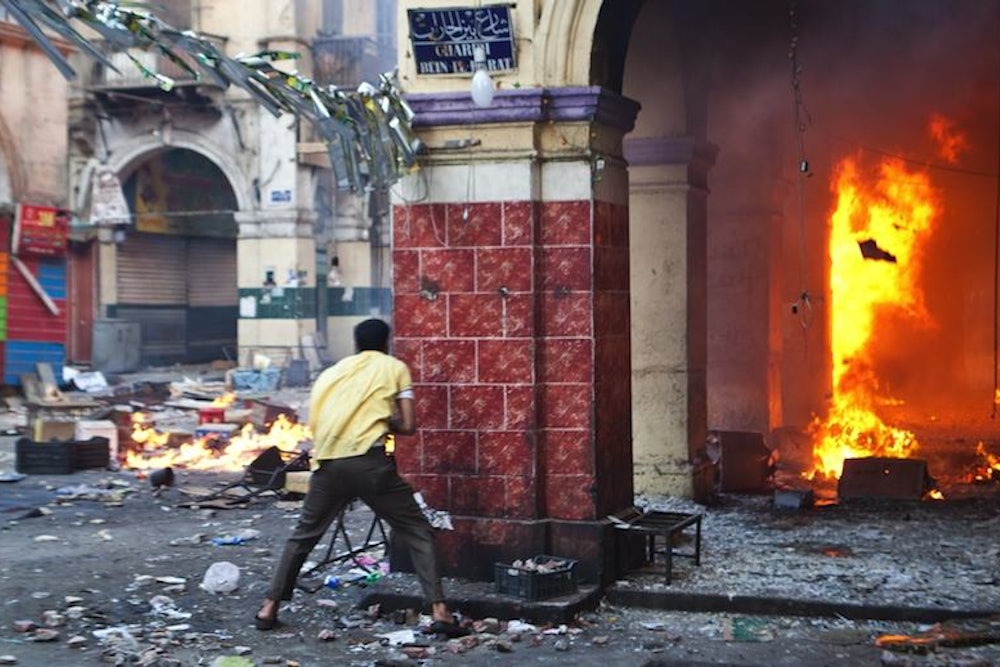CAIRO—“O Sisi! O villain! The blood of Muslims isn’t cheap!” protesters chanted. In Arabic, it rhymes. Thousands of supporters of ousted Muslim Brotherhood president Mohamed Morsi braved the midday August heat and the almost certain violence of the security forces after Friday prayers. Many had come to protest the killings that took place when the military and police dispersed their sit-ins two days ago and to renew their calls for the reinstatement of ousted president Mohamed Morsi. Young men waved open water bottles over the heads of the crowd. “Natural air conditioning,” one man said, grinning.
Mohamed al Hashemi, who worked in a petrol company, said he had brought medical supplies to the field hospital at Rabaa el Adaweya during the sit-in dispersal two days ago, braving sniper fire to get them through. Tall with a neat mustache and polo shirt, he hardly looks like a hardline Islamist. That’s because he isn’t one. As he walks away he jokes, “I’m a terrorist,” referring to how the Muslim Brotherhood has been portrayed in the media for the last six weeks. Five hours later, he was dead.
Many at the protest knew the risks when they took to the streets after Egyptian authorities had authorized the use of deadly force by police “to protect themselves and state institutions” on Thursday, a vague directive that largely absolves police of any accountability. The atmosphere was one of resolve: “They are going to kill us tonight,” said Mustapha Ahmed, a geologist who declined to give his last name for fear of identification by the security forces. “We are ready to die for our freedom” he said, and, “I came to express my sad feelings about my friends,” two of whom were killed in the sit-in dispersal two days ago.
Within half an hour of that conversation tear gas canisters were fired into the crowds, followed immediately by live ammunition. Dr. Nagy Inam who was at the scene when the shooting began reported seeing guns fired from helicopters and birdshot and live fire from a police station nearby.
Outrage at the level of violence against largely unarmed protesters has been muted over the last six weeks, largely as a result of the systematic dehumanization and discrediting of the ousted president, his supporters and his organization on the part of the media, the army and the new government. Within hours of Morsi’s ouster, the army shut down several Islamist channels. Armored personnel carriers surrounded the state media building and members of the security forces were stationed inside. State-controlled media once again meant army-controlled as it did when the Supreme Council of the Armed Forces took power after Mubarak’s fall and began to refer to pro-Morsi supporters as "terrorists." Independent channels followed suit. Everywhere the protesters at the sit-ins and the Brothers were denounced as terrorists. Meanwhile, General Sisi is framed by many as a new Gamal Abdel Nasser, and the natural heir to Egypt’s executive leadership.
The threat of dispersal hung over the camps for several weeks before it was carried out. The Muslim Brotherhood leadership knew that a violent crackdown was likely, but it did little to warn its supporters of the risk; in fact, it continued to raise the crowd's expectations that Morsi might soon be reinstated, even after it became clear that he never would. (The construction of a large children's playground in the front of the camp suggests even that the Brotherhood was thinking about making the optics of the inevitable crackdown as bad as possible.) The army too has interests to protect, namely their significant stake in the economy and their behind-the-scenes influence on Egyptian politics. Savvier now under the youthful charismatic leadership of General Abdel Fattah el Sisi than they were under the geriatric Tantawi, they exploited popular support first for the coup, then they sought it again, calling on Egyptians to, “take to the streets this Friday to grant [him] the power to face potential violence and terrorism.” Over 80 pro-Morsi demonstrators were killed in the violence that followed.
Clashes continue between Morsi supporters and other Cairo residents tonight. I have not heard of one instance of police intervention. Egyptians fighting one another in the streets seems to be part of the plan, to the extent that there is one, to allow violence and instability to escalate to such an extent that a military crackdown is justified.
Both sides have exploited the frustration of the vast majority of the Egyptian populace with the economic and political stagnation over the last two and a half years and more broadly under 30 years of Mubarak. Whether either side will be able to control what they have unleashed remains to be seen.
Laura Dean is a freelance journalist based in Cairo. Previously Laura worked for the Senate Foreign Relations Committee and as an election observer in Egypt, Tunisia and Libya. She writes about all things Egypt at "Laura Dean's Cairo Diary."
